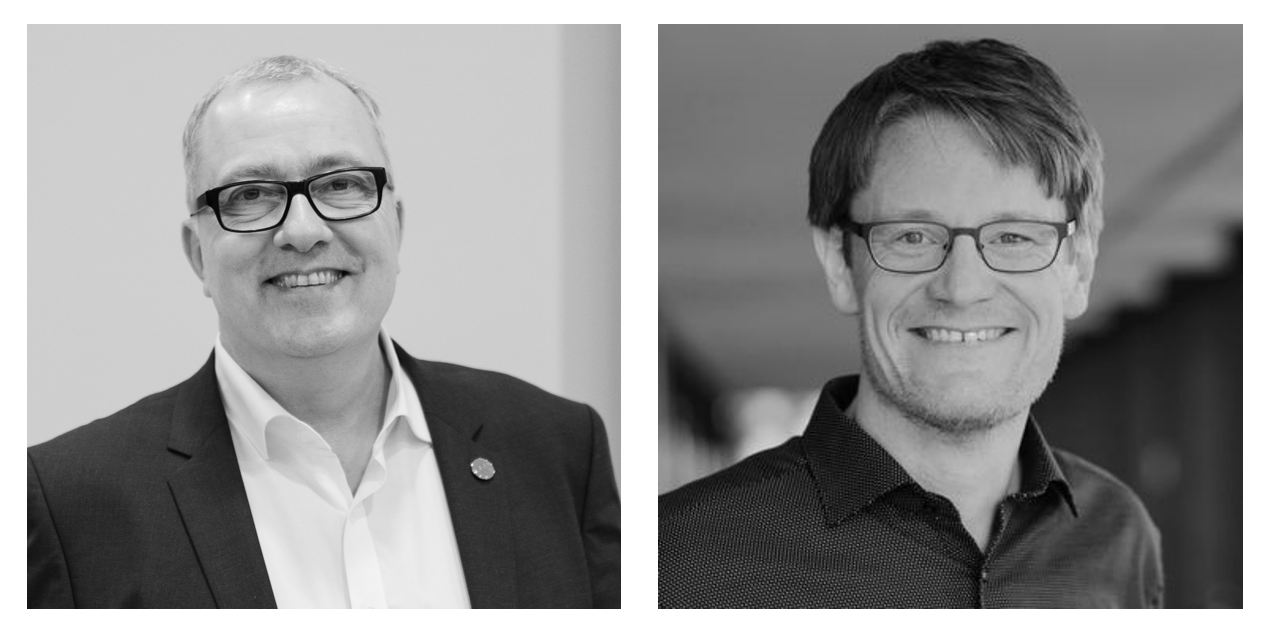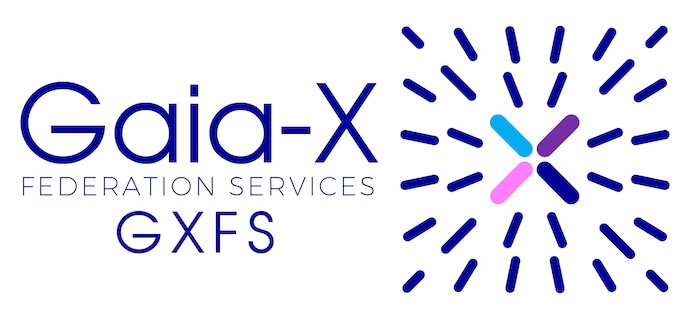
An interview with Andreas Baur, Political Scientist

Andreas Baur conducts research in Tübingen and Amsterdam on the (geo)political framework conditions for the cloud. The political scientist is convinced: Regulation that disregards technology will not work. In the interview, he reveals how political concepts are embedded in technology and why initiatives like Gaia-X represent a new form of international technopolitics.
Mr Baur, you are a political scientist and research critical network infrastructures. The cloud and initiatives like Gaia-X are also among your topics. What are you currently working on?
I am currently doing a PhD on the Politics of the Cloud at the Institute for Social Science Research at the University of Amsterdam. I am also a research associate at the International Centre for Ethics in the Sciences and Humanities at the University of Tübingen and a member of the Forum Privacy. There, we deal with the security of infrastructures and topics such as privacy and data protection in various projects.
As a political scientist, what interests you about IT infrastructures?
Technology is political. It enables, influences or prevents action. To give you an example: We conducted a study on automated security decisions at airports. The results show: When technology decides, it never does so neutrally because it functions according to the standards of its builders – only amplified many times over. Because digital technology scales human efficacy through automation and thus also potentiates programmed biases and misjudgments. We must prevent our technology from constantly becoming the turbocharger of our weaknesses.
What makes the cloud a political issue?
With the cloud, the technology’s agency, as we call it, is particularly high: We are not just dealing with a few devices here but with a connected and global infrastructure. This creates the basis for many other technologies. It influences the ability of billions of people to cooperate. We all need the cloud to access, process and share data. But the cloud has a place and a legal status. It is thus subject to access not only by companies but also by states in whose jurisdiction the data centres operate. The cloud has become a geostrategic asset.
How does geostrategy make itself felt in the cloud?
In simple terms: Authoritarian states like Russia or China rely on isolation and data control within their territories. The USA, on the other hand, relies more on radical freedom of expression and, at the same time, capitalistically permissive marketing of data. Europe is increasingly trying to pursue a third way: We would like to see stronger control of platforms under the rule of law and more protection of individual privacy.
What problems do conflicting geostrategies cause in the cloud?
Europe does want to protect its interests and values in the cloud. However, we are dependent on non-European technology and have to accept the extensive surveillance of our data traffic by, e.g., US intelligence services. Ten years ago, the whistleblower Edward Snowden revealed in the NSA affair what kind of battle is being fought here. This is one of the reasons why, for years, European companies have only been able to use the dominant US platforms under high legal risks. In addition to intelligence access, there are many other geostrategic factors in the cloud, such as access to microchips, the availability of cognitive resources such as innovation capacity, patents, skilled labour, but also market share and access to affordable and green energy. Those who lose touch here and become dependent forfeit political sovereignty.
Because of such dependencies, the EU and European governments speak of a market failure in the cloud. How do you rate that?
I am not an economist. But market failure manifests itself, for example, through severe power imbalances. These are obvious in the cloud market. Today, a handful of platform companies divide the market up among themselves. With each additional customer, they benefit from network effects that consolidate their dominance. Hyperscalers set de facto standards and determine access to cloud resources. Their influence is great enough that they even limit the exchange of data between different platforms. Initiatives like Gaia-X are trying to bring forward an alternative vision to this development. They want to remove standards and rules of the game for the cloud from the individual interest of companies and balance the geostrategic agenda of non-European powers.
In the context of Gaia-X, there is talk of data sovereignty. What is the politicalscientist’s view on this?
I think it is remarkable that sovereignty suddenly plays such a role in the digital transformation. The concept of sovereignty is very old. It comes from traditional political reflection and is now applied to modern technology. The term data sovereignty shows how much data is becoming the key to the self-determination and independence of individuals and collectives in the 21st century – and, simultaneously, a political challenge. In my doctoral thesis, I investigate how these classical concepts such as sovereignty are transformed and applied in the technopolitical context of the cloud. In some cases, attempts are being made to implement such political ideas technically. Thus, the vision of a non-territorial cloud is suddenly combined with an idea that is strongly bound to territorial borders and demarcation.
Why is it so difficult for politics to contain the consequences of technology?
The problems we are talking about arise in the interplay between technology and society or politics, because the social and the technological interact with each other. Therefore, these problems cannot be solved by technology alone, such as faster chips, encryption or smarter algorithms. Nor can they be solved solely through external intervention, for example through laws that prohibit or regulate a particular use of technology. I am fascinated by the question of interplay: How can political concepts be embedded in technology? In the social sciences, we speak of technopolitical solutions.
How do you understand technopolitical solutions?
Since technology itself has power to guide action, its design is also highly relevant. In the end, the question is what good governance can look like in this interplay between regulation and technology design. This cannot be done without technical expertise. Regulation that disregards technology will not work. Good rules, on the other hand, are what make a system work. To do this, you also have to think from the end in terms of technology development. We also call this a technological impact assessment.
How can technopolitics be applied to the cloud?
Initiatives like Gaia-X do not see politics and technology as separate spheres but as necessary components for new solutions. This is not only about technical standards. In fact, the vision of Gaia-X – we in the social sciences also speak of so-called socio-technical imaginaries – goes beyond this: The initiative aims to create an ecosystem of cloud services in Europe that thinks regulation less through compulsion and more through incentives. I observe that privacy, data sovereignty, interoperability and market transparency are strong arguments for participating in such an ecosystem. Not only for customers but also for SMEs and specialised service providers who have struggled in the cloud market so far. This vision is very present in the discussions with initiators and participant companies. Such shared visions are very powerful and can move political mountains and bridge conflicts.
How would you describe the role of Gaia-X in the cloud market?
Just as the Internet was developed as a network of networks, Gaia-X seems to me to be a cloud of clouds that, if successful, will grow into a Europe-wide ecosystem. Now in its early stages, Gaia-X is perhaps best described as an “honest broker”: For example, the Gaia-X catalogue services provide user companies with comprehensible criteria for comparing cloud services. By attempting to inscribe transparency into processes, Gaia-X federations can use their catalogues to vouch for certain service qualities. Trust is a social value that should be supported here through technology and practice.
Can an international initiative effectively guide technical development?
There are even historical models for this: An often forgotten example is the International Telecommunications Union, ITU for short. The ITU is a specialised agency of the UN based in Geneva that enjoys status under international law. It is the only one of its kind that takes care of binding telecommunications standards and rules for the whole world, for example for the use of frequencies or country codes for telephone numbers. Nevertheless, even in our highly interconnected world, such institutions are still an exception.
What makes international approaches like the ITU a model?
Only on platforms like those of the ITU or perhaps in multi-stakeholder approaches can we discuss questions about how we organise technology worldwide so that as many people as possible benefit from it. There was also much debate in the ITU about the Internet as a global infrastructure. Political scientists find such institutions interesting because of the conflicts of interest that are visibly and productively resolved on their stage. At the ITU, the open-market, US-American Internet protocol prevailed over the state-monopolistic approaches from Europe, such as the German BTX or the French Minitel.
Unlike the ITU, Gaia-X is a private initiative, despite government support. Can the two organisations be compared?
Gaia-X is indeed unusual because the initiative breaks new ground organisationally. There is a non-profit association as a central association in Brussels. But the Gaia-X European Association for Data and Cloud AISBL is not an agency of the EU Commission. Gaia-X is, first and foremost, an association of business and research.
How can the different interests in Europe be reconciled?
Gaia-X is not a conventional form of self-regulation in any market: In its form, the initiative is a typically European growth, with many advantages and disadvantages of the European tradition of compromise and balance. Opinion-forming is organised in a sophisticated way: Thus, Gaia-X is neither exclusively centralised nor decentralised, but both. Many companies are not members of the central association in Brussels but are involved in the national hubs of the initiative, which cooperate closely with the AISBL without being an institutional part of it. The initiative acts in a coordinated manner. At the same time, it is strongly networked in the individual EU member states. In this complexity, the entity is naturally dependent on the different requirements of the different economies of the Union. This governance process is unique in the world. However, it must also find resonance in civil society.
Do you doubt public acceptance for a European data ecosystem?
Involving civil society is no small feat for initiatives like Gaia-X. Their concern is technically complicated and dry. Opinion-forming and balancing of interests among the participating organisations is exhausting. So it’s not a topic for talk shows, although it will have a major impact on our everyday lives and our future viability in Europe. Rules for data ecosystems go far beyond economic interests. Ultimately, all civil society sectors can benefit. In fact, the actors of the initiative are making a great communication effort, but it is still strongly directed at a professional audience. The concerns of Gaia-X need to be shared even more with the general public, while simultaneously creating good opportunities for involvement.
Mr Baur, thank you for the interview.
Andreas Weiss & Thomas Sprenger

Every month on LinkedIn and www.gxfs.eu
Every month from now on, we will guide you through the world of Gaia-X on LinkedIn and www.gxfs.eu. Our analyses and interviews give background and insights into how a European initiative and its collaborators want to create an ecosystem for value creation from data.
Heading this series of articles is Andreas Weiss. As Head of Digital Business Models at eco as well as Director of EuroCloud Deutschland_eco, Andreas Weiss is well connected and familiar with the Internet and cloud industry in Europe. He brings his experience to Gaia-X Federation Services (GXFS), whose project teams are responsible for the development of Gaia-X core technologies. Led by eco, the GXFS-DE project is also funded by the German Federal Ministry of Economic Affairs and Climate Action and is in close exchange with the Gaia-X Association for Data and Cloud (AISBL). Weiss is supported on this blog by Thomas Sprenger, an author and copywriter who has been writing about the digital transformation for twenty years.
